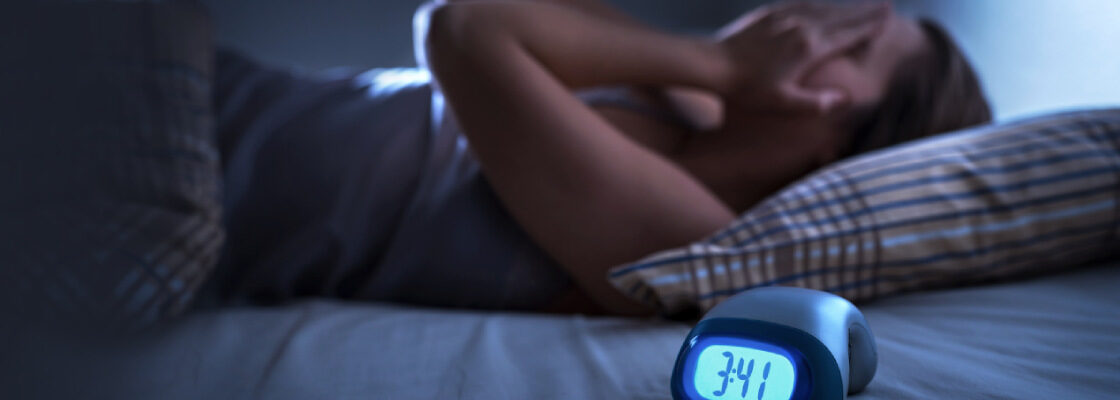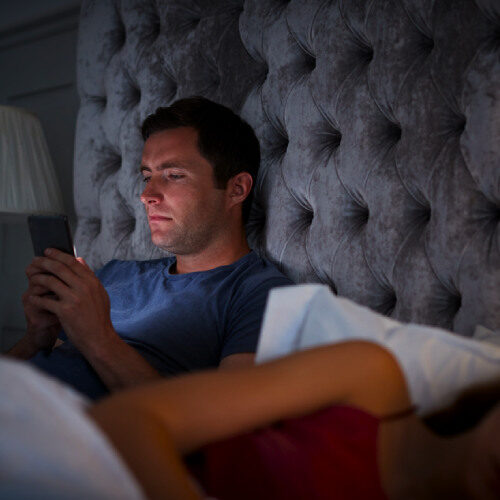Sleep Dysfunction Treatment In San Diego
A lot of people nowadays are experiencing difficulties with sleeping, whether that’s having trouble falling asleep, staying asleep, or feeling unrested upon waking up.

Symptoms of poor sleep include:
- Fatigue
- Drowsiness
- Forgetfulness
- Lack of concentration
- Weight gain
- Decreased memory
- Reduced tolerance to stress
- Decreased mood
- Decrease in strength
Sleep is often overlooked when it comes to health, but it has a major impact on both mental and physical well-being. Getting adequate sleep helps the body regenerate, allowing for the secretions of growth hormone (the so-called “anti-aging” hormone) and scavenging of free radicals. Furthermore, sufficient sleep can also lead to improved alertness, memory, and general mental functioning.


Factors that disrupt sleep
Sleep is a complicated process, heavily influenced by:
- Hormones (e.g. cortisol and melatonin)
- Our environment (such as the presence of light)
- And our own thoughts.
It can be affected by factors such as medical conditions, emotional states, age, shift-work, and neurotransmitter imbalances.
These difficulties may stem from any phase of the sleep cycle; for instance, some people have trouble falling asleep in the first place and don’t get enough restorative sleep whereas others may wake up often throughout the night or feel like they’re not reaching deep sleep.
Sleep apnea
Sleep apnea is a common but serious condition where a person stops breathing for brief moments when asleep, cutting off oxygen supply to the brain and heart. If you or your partner notices any snoring or gasping for breath during sleep, it’s important to seek medical advice from your health-care provider to check whether it could be caused by sleep apnea.
Screen use and sleep disturbance
The overuse of electronic devices such as:
- Cell phones
- Tablets
- Computers
- TVs
Before bed is rampant and causes the brain to produce less melatonin, which is a hormone that helps regulate our sleep-wake cycle.
As a result, you might feel less sleepy right before bedtime, but feel even more tired the next day.
It’s important to limit your use of electronics near bedtime in order to keep your melatonin levels up and ensure healthy sleep.

Keys to optimizing sleep
Getting quality sleep is essential for long-term health and wellbeing. It can help revitalize us, improve our outlook on life, and give us the energy to reach our goals. Achieving a good night’s sleep is one of the best ways to set yourself up for success. There are many crucial environmental factors that influence sleep quality.
Here are some factors to optimize your sleep:
- Screen time. Cut out technology at least one hour before bedtime for better sleep. Instead, draw yourself a warm bath, curl up with a good book, or do some light stretching to relax and wind down.
- Electronics. Devices such as TVs, cell phones, computers, and modems produce electromagnetic fields (EMFs) that can negatively impact sleep for some people. Try moving these into an adjacent room. Put your cell phone outside your bedroom, possibly in your bathroom. You’lll still hear it ring if there is an emergency and you’ll still be able to hear the alarm, just make sure to turn the ringer up on high.
- Caffeine. Cut out caffeine after 2pm or consider eliminating it entirely if necessary.
- Nicotine. Quitting smoking can be the key to a better night’s sleep. Nicotine stimulates the brain in ways that interfere with your natural sleep cycles, making it difficult to both fall asleep and stay asleep. Non-smokers are often able to get much more restful sleep, so let us help you quit smoking and enjoy the restful nights you deserve.
- Alcohol. While drinking alcohol in the evening may appear to help you get to sleep quicker, it can actually have a negative impact on the quality of your sleep. Alcohol can lead to disrupted sleep patterns, waking during the night, nightmares, and overall poor quality rest. For better nights of sleep, avoid alcohol before bedtime.
- Exercise. Regular exercise is one of the few proven methods for increasing high-quality deep sleep in seniors. Exercising during the day can help promote overall better sleep, but exercising too close to bedtime can be overly stimulating and make it difficult to fall asleep.
- Regular sleep schedules. Establishing a routine of going to bed and waking up at the same time each day can help your body’s natural rhythms fall into sync. Unfortunately, shift work disrupts these rhythms and can cause significant sleep problems; if possible, it’s best to avoid this kind of work schedule.
- Sleeping environment. The ideal temperature for sleep is 69 degrees. Keep lighting dim enough so that you can barely see the outline of your hands.
- B Vitamins and vitamin D. Avoid these two supplements in the late afternoon and evening since they can impair sleep.
- Supplements for sleep. When it comes to supplementation for sleep there are two main things to consider. One is increasing melatonin with sustained release melatonin, or by consuming its precursors i.e. L-tryptophan or 5-HTP. The other is to relax and calm the nervous system with supplements like magnesium, GABA, glycine, or adaptogenic herbs such as ashwagandha.

